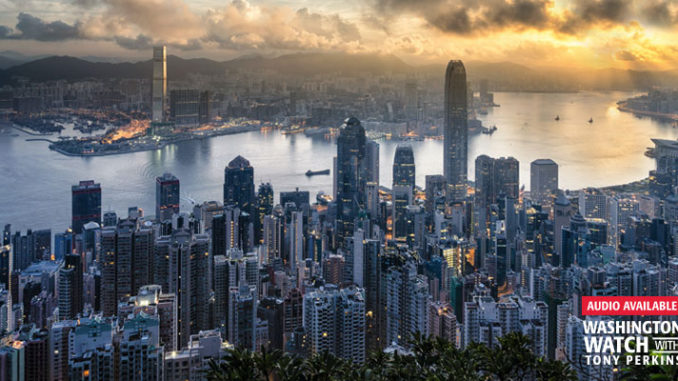
By: Tony Perkins
July 1, 2020
Faced with worldwide and local frustrations for its handling of the coronavirus crisis, China has made a power move, tightening its control of neighboring Hong Kong, which threatens its “status as one of the world’s most prominent financial hubs.” China’s Communist Party passed a national security law designed to curb protest and dissent. The law went into effect Tuesday night and Hong Kong police wasted no time using it to make arrests.
“Hong Kong right now, for all intents and purposes, is just part of the mainland. There is no high degree of autonomy … this is really just China’s fully absorbing Hong Kong,” noted prominent China expert and author Gordon Chang on Tuesday’s Washington Watch. “Beijing is going to set up a national security office in Hong Kong, which would be for the first time … So, the long arm of China just got a little bit longer.”
The repercussions of the new law are already impacting free speech and the work of pro-democracy efforts.
“Many people have canceled their Twitter accounts because they are afraid of China looking into them,” said Chang. “(W)e are seeing pro-democracy forces actually just sort of try to blend in right now, try to avoid what China’s going to do, because many people do fear something that they call Operation Thunderbolt, which is that immediately upon China taking over Hong Kong, they will start to round up hundreds, maybe even thousands of people and ship them off to mainland courts. I don’t know if China will actually do it, but that has really frightened many people in Hong Kong.”
The U.S. government is already withdrawing special privileges from Hong Kong, such as allowing dual use equipment, products or technology usually used for regular commerce but can be used in military applications. Chang speculated that Chinese banks may lose privileges in the U.S. and visa restrictions could be enacted. And he urged the Trump administration to reconsider the diplomatic status of Chinese officials in the U.S. known to have been engaged in spying here in America.
But given the fact that China is known to force those it doesn’t like into slave labor camps creating cheap goods, it’s also important for the United States business community to reconsider partnering with China.
Chang observed, “(I)t’s up to the Trump administration to change the incentives for big box retailers to favor China over domestic producers. So, there are a lot of parties here that can actually change their behavior. And we’ve got to work on all of them because we are seeing China, this unprecedented attack, not just on Hong Kong or not just on India, but also the United States as well, because we’ve got to remember one hundred and twenty-nine thousand deaths of Americans due to coronavirus.”
In light of so many lives at risk, it’s important that the Trump administration continue to confront this crisis. Ironically, all of this is taking place as big business in the United States is claiming the mantle of social justice while virtually ignoring this entire drama playing out on the world stage. The hypocrisy is striking.
